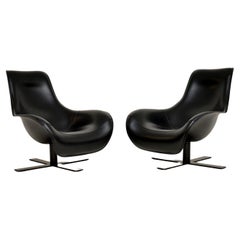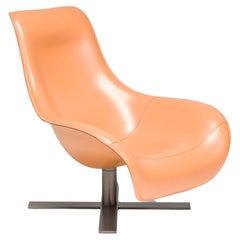Antonio Citterio Mart Armchair
Recent Sales
Early 2000s Italian Mid-Century Modern Swivel Chairs
Steel
Early 2000s Italian Lounge Chairs
Stainless Steel
21st Century and Contemporary Italian Modern Lounge Chairs
Chrome
Early 2000s Italian Modern Armchairs
Metal
Early 2000s Italian Lounge Chairs
Stainless Steel
B&B Italia for sale on 1stDibs
In 1966, Piero Ambrogio Busnelli cofounded C&B Italia, a modern Italian furniture manufacturer, with Cesare Cassina in northern Milan. From the outset, Busnelli and Cassina set about recruiting the most talented modernists in Italy to conceive of creative furnishings manufactured in modern ways. In the early 1970s, the company split, with Cassina founding his own eponymous firm and Busnelli taking leadership of what became B&B Italia.
For decades, Busnelli cultivated relationships with the world’s best design talent, resulting in furniture pieces that remain iconic today — be they Gaetano Pesce’s outwardly curvaceous Up seating (made for C&B, reintroduced by B&B) or tables from industrial designer Paolo Piva, each more sophisticated than the next in their geometrically complex steel-tube bases. B&B Italia earned four prestigious Compasso d’Oro design awards: in 1979 for Mario Bellini’s Le Bambole, in 1984 for the Sisamo wardrobe system by Studio Kairos, in 1987 for Antonio Citterio’s modular Sity sofa and, in 1989, the first award given to a manufacturing company itself.
Other notable names who designed for B&B Italia over the course of its 54-year history include Patricia Urquiola, Naoto Fukasawa, Zaha Hadid, Ettore Sottsass and Vincent Van Duysen, to name a very few. And while these names bring star power to the B&B brand, in many cases, it was B&B Italia who helped usher in their celebrity, fostering a wave of design talent on the world stage.
The company’s forward-thinking vision manifested in its own headquarters, too: In 1972, B&B Italia tapped architects Renzo Piano and Richard Rogers to design a steel-framed, postmodern-style home for the brand, whose crisscrossing metal exoskeleton is reminiscent of the pair’s Centre Pompidou in Paris, which was built at roughly the same time. Now, B&B Italia manages a contract division and outdoor section as well as its residential arm, and it also controls production for Maxalto, a brand spun out with furniture designs by Antonio Citterio.
At 1stDibs, find a range of vintage B&B Italia furniture — including sofas, cocktail tables and more.
Finding the Right Armchairs for You
Armchairs have run the gamut from prestige to ease and everything in between, and everyone has an antique or vintage armchair that they love.
Long before industrial mass production democratized seating, armchairs conveyed status and power.
In ancient Egypt, the commoners took stools, while in early Greece, ceremonial chairs of carved marble were designated for nobility. But the high-backed early thrones of yore, elevated and ornate, were merely grandiose iterations of today’s armchairs.
Modern-day armchairs, built with functionality and comfort in mind, are now central to tasks throughout your home. Formal dining armchairs support your guests at a table for a cheery feast, a good drafting chair with a deep seat is parked in front of an easel where you create art and, elsewhere, an ergonomic wonder of sorts positions you at the desk for your 9 to 5.
When placed under just the right lamp where you can lounge comfortably, both elbows resting on the padded supports on each side of you, an upholstered armchair — or a rattan armchair for your light-suffused sunroom — can be the sanctuary where you’ll read for hours.
If you’re in the mood for company, your velvet chesterfield armchair is a place to relax and be part of the conversation that swirls around you. Maybe the dialogue is about the beloved Papa Bear chair, a mid-century modern masterpiece from Danish carpenter and furniture maker Hans Wegner, and the wingback’s strong association with the concept of cozying up by the fireplace, which we can trace back to its origins in 1600s-era England, when the seat’s distinctive arm protrusions protected the sitter from the heat of the period’s large fireplaces.
If the fireside armchair chat involves spirited comparisons, your companions will likely probe the merits of antique and vintage armchairs such as Queen Anne armchairs, Victorian armchairs or even Louis XVI armchairs, as well as the pros and cons of restoration versus conservation.
Everyone seems to have a favorite armchair and most people will be all too willing to talk about their beloved design. Whether that’s the unique Favela chair by Brazilian sibling furniture designers Fernando and Humberto Campana, who repurposed everyday objects to provocative effect; or Marcel Breuer’s futuristic tubular metal Wassily lounge chair; the functionality-first LC series from Charlotte Perriand, Le Corbusier and Pierre Jeanneret; or the Eames lounge chair of the mid-1950s created by Charles and Ray Eames, there is an iconic armchair for everyone and every purpose. Find yours on 1stDibs right now.

